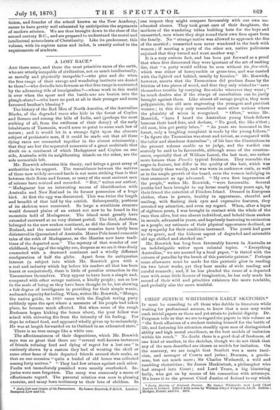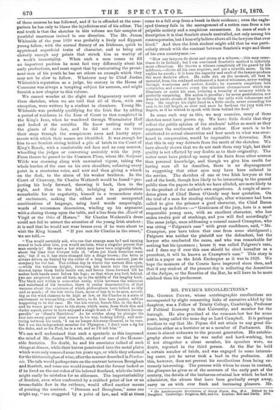CHIEF JUSTICE WHITESIDE'S EARLY SKETCHES.* Ix must be consoling to
all those who dabble in literature while waiting for professional success, to know that a man may write such trivial papers as these and yet attain to judicial dignity. Dr. Ferguson tells us that we are to regard the papers iu this volume as " the fresh effusions of a student training himself for the battle of life, and fastening his attention steadily upon men of distinguished ability and high moral excellence, as the best models of imitation within his reach." No doubt there is a good deal of freshness, of one kind or another, in the sketches, though we do not think that any of the men described are chosen as models for imitation. On the contrary, we are taught that Scarlett was a mere tacti- cian, and manager of Courts and juries ; Denman, a gentle- man, but not much more ; Sir Charles Wetherell, a wild and rambling rhetorician ; Sir James Mackintosh, a philosopher who had strayed into Court ; and Lord Truro, a big blustering bully, who got on by means of his connection with attorneys. We leave it to the present Chief Justice of Ireland to say which
• Early Sketches of Eminent Persons. By James Whiteside, now Lord Chief' Justice of Ireland. Edited with notes by William Dwyer Ferguson, LL.D. Dublin :. Hodges, Foster, and Co. 1870.
of these courses he has followed, and if he is offended at the com- parison he has only to blame the injudicious zeal of his editor. The real truth is that the sketches in this volume are fair samples of youthful smartness trained in one direction. The Mr. James Whiteside of the year 1830 was probably a lively and flippant young fellow, with the normal fluency of an Irishman, quick to apprehend superficial traits of character, and to bring out cleverly enough any points that struck him as worthy of a week's immortality. When such a man comes to fill an important position he must feel very differently about his early productions, and must regret that by caricaturing the promi- nent men of his youth he has set others an example which they may not be slow to follow. Whatever may be Chief Justice Whiteside's reputation as a judge, his oratory in the House of Commons was always a tempting subject for sarcasm, and might furnish a new chapter to this volume.
We cannot wonder at the slight and fragmentary nature of these sketches, when we are told that all of them, with one -exception, were written by a student in chambers. Young Mr. Whiteside was probably qualifying for the Irish Bar by adding a period of residence in the Inns of Court to that completed in the King's Inns, when he wandered through Westminster Hall and looked at the notables. He knew nothing really of the giants of the law, and he did not care to trace
their steps through the conspicuous cases and knotty argu- ments with which their names are identified. It was enough for him to see Scarlett sitting behind a pile of briefs in the Court of King's Bench, with a comfortable red face and an easy manner, wheedling the judges or conversing amicably with the jury. From thence he passed to the Common Pleas, where Mr. Serjeant
Wilde was storming along with unwearied vigour, taking the whole burden of the case on his own shoulders, enforcing every point in a stentorian voice, and now and then giving a whack on the desk, to the alarm of his weaker brethren. In the Court of Chancery, Sir Charles Wetherell would be found "pro- jecting his body forward, throwing it back, then to the right, and then to the left, indulging in gesticulation remarkable for its angularity, himself in a tremendous state of excitement, making the oddest and most unexpected combinations of language, using hard words unsparingly,
words of uncommon dimensions, winding up his argument with a closing thump upon the table, and aline from the 1Eneid of Virgil or the Odes of Horace." Sir Charles Wetherell's dress
could not fail to attract the attention of the young Irish student ; it is said that he would not wear braces even if he were about to -visit the King himself. " If you met Sir Charles in the street," we are told,—
g‘ Yon would certainly ask, who can that strange man be? and turning round to look after him, you would exclaim, what a singular person that man surely is! He wears a hat which may have been originally black, about the time that Cowper tells of, ' when yet black breeches were sot; ' but if so, it has since changed into a dingy brown ; the brim is always driven up behind by the collar of a long brown surtout, just fit -company for the hat. The coldest day in winter the surtout flies open, —while the valorous knight, thrusting his hands into the pockets thereof, turns them fairly inside out, and forces them forward till he makes both hands meet before his legs; so that when you look behind, you are surprised to see all bare, up to the middle of the lengthy back. The black suit within is somewhat seedy, while between the waistcoat -and waistband of his breeches, there is ocular demonstration of that vacuum about the existence of which philosophers have talked so idly and so much ; of the fair white linen, more or less is to be seen, accord- ing as the wind chances to be high er low, or Sir Charles in a state of -excitement or tranquillity,—tbe latter, to do him bare justice, seldom happening to be the case. He ties his cravat, bunch-like, in the dark ; and ho wears great tapes in his shoes, which seem, from their dim and -dusky aspect, never to have enjoyed a single brash of Warren's Incom- parable' or ' Hunt's Matchless.' As he strides along he plunges his loot into every gutter that comes in his way, looking loftily, and mut-
tering between his teeth, am no longer Attorney-General, to be sure, but I am the independent member for Plympton ; I don't care a fig for the duke, and as for Peel, he is a rat, and so I'll tell him.'"
We can well understand that such a spectacle as this impressed the mind of Mr. James Whiteside, student of one of the Honour- -able Societies. No doubt, he and his associates talked of such things at dinner, while their knives penetrated into the metal plates which were only removed some ten years ago, or while they schemed for the thirteenth glass of wine, afterthe manner described in Penden- ads. The talk would perhaps turn on the contrast between Brougham and Scarlett, and some one would remark that the former looked as if he lived on the oat-cakes of his beloved Scotland, while the latter might easily be mistaken for an alderman. The imperturbability of Scarlett, even when confronted by a crabbed point of law or an irremediable flaw in the evidence, would afford another means of pointing the contrast. "Denman and Brougham," some one might say, "are staggered by a point of law, and will at times
come to a full stop from a break in their evidence ; even the eagle- eyed Gurney fails in the management of a rotten case from a too palpable anxiety and a suspicious earnestness. In cases of such a description it is that Scarlett stands unrivalled, not only among his contemporaries, but I honestly believe above all the lawyers that ever lived." And then the Irish student might add that he was parti- cularly struck with the contrast between Scarlett's ways and those of his own countrymen :—
" How our lawyers do shout and storm at a witness,—this may some- times do in Ireland ; but I am convinced Scarlett's method is infinitely more efficacious. He throws a witness completely off his guard by his mildness,—elicits all his case requires, and not a scintilla more. In his replies he excels ; it is here the sagacity and craft of the lawyer produce the most decisive effect. He culls out, on the moment, all that is material, from the confused evidence of a host of witnesses, never wading through wearisome and useless details; he converts suspicions into certainties, and connects every the minutest circumstance which can illustrate or assist his case, evincing a tenacity of memory which is perfectly surprising. His action is peculiar ; he never gesticulates, nor does he excite clouds of dust by striking the table with vehemence and fury. He employs his right hand in a little circle, never extending his arm to its full length, as ever and anon he beckons the jury with two fingers, as if he wished to speak with them behind the door."
In some such way as this, we may conceive, many of these sketches must have grown up. We have little doubt that they reflect the public opinion of the students' tables as much as they represent the sentiments of their author. How much is to be attributed to actual observation and how much to what was over- heard in conversation, would be impossible to determine. Not that this in any way detracts from the merit of the sketches. We have already shown that we do not rank them very high, but their quality is not affected by any doubts as to their originality. The writer must have picked up many of his facts from other sources than personal knowledge, and though we give him credit for having seen all he describes, there is no disparagement in suggesting that other eyes may have been enlisted in the service. The sketches of one or two Irish lawyers at the end of the book, though less likely to be interesting to the general public than the papers to which we have alluded, are more likely to be the product of the author's own experience. A couple of anec- dotes given of Chief Baron O'Grady may bear quotation. On the trial of a man for stealing stockings, after witnesses had been called to give the prisoner a good character, the Chief Baron summed up as follows :—" Gentlemen of the jury, here is a most respectable young man, with an excellent character, who has stolen twelve pair of stockings, and you will find accordingly." The same judge, once addressing a counsel named Crampton, who was citing " Palgrave's case" with great confidence, said, "Mr. Crampton, you have taken that case from some abridgment ; Palgrave was neither the plaintiff nor the defendant, but the lawyer who conducted the cause, and who was remarkable for nothing but his ignorance ; hence it was called Palgrave's case, and I dare say if ever this case sliould be cited hereafter as a precedent, it will be known as Crampton's case." This story is told in a paper on the Irish Exchequer as it was in 1829. We hope the manners of the Courts have improved since then, and that if any student of the present day is collecting the Amenities of the Judges, or the Beauties of the Bar, he will have to be more subdued than his predecessor.































 Previous page
Previous page